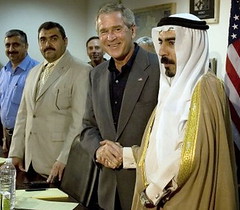Anbar Is Not Missouri
When the President poked his head into Anbar Province, he spent an hour with Sattar Abu Risha, a Sunni tribal sheik notorious for highway banditry and petty theft, a con man pretty much any way you look at it. He was also held up as the de facto leader of the Administration's brand-new "bottom-up" security strategy.
Sheikh Sattar, whose tribe is notorious for highway banditry, is also building a personal militia, loyal not to the Iraqi government but only to him. Other tribes — even those who want no truck with terrorists — complain they are being forced to kowtow to him. Those who refuse risk being branded as friends of al-Qaeda and tossed in jail, or worse. In Baghdad, government delight at the Anbar Front's impact on al-Qaeda is tempered by concern that the Marines have unwittingly turned Sheikh Sattar into a warlord who will turn the province into his personal fiefdom.
Risha was murdered today.
The most prominent figure in a U.S.-backed revolt of Sunni sheiks against al-Qaida in Iraq was killed Thursday by a bomb planted near his home in Anbar province, 10 days after he met with President George W. Bush, Iraqi and U.S. officials said.
Abdul-Sattar Abu Risha and two of his bodyguards were killed by a roadside bomb planted near the tribal leader's home in Ramadi, Anbar's provincial capital, said Col. Tareq Youssef, supervisor of Anbar police.
Abu Risha was leader of the Anbar Salvation Council, also known as the Anbar Awakening — an alliance of clans backing the Iraqi government and U.S. forces. His death deals a sharp blow to American efforts to recruit tribal leaders to fight terror.
Obviously, al Qaeda will be seen as responsible; in fact, Gen. Petraeus has already said as much. But it appears Risha had a lot of enemies. He was forcing other Sunni tribes into acting under his command, under threat of being branded as al Qaeda. The central government in Baghdad didn't want to see him set up a personal Sunni kingdom out in the desert and resist efforts to unify. Risha granted an interview recently to Al Jazeera which added to those worries.
Enders interviews the famous Sattar Abu Risha in Amman (he claims to be the leader of all Iraq's Sunni tribes, and makes some rather grand promises), and also presents harsh criticism of Abu Risha from his rival Ali Hatem (who denounces Abu Risha as a con man and fraud, as he has repeatedly to various American journalists) [...]
Hatem and the Shia head of Maliki's reconciliation office both warn that the Americans are pouring weapons into the hands of people who will still have those weapons once the immediate AQI problem is gone. Maliki's guy describes it as bringing a "baby crocodile" into the house which will grow into a monster, warning that putting more guns into the hands of "war criminals" responsible for sectarian cleansing guarantees more bloodshed down the road. Hatem warns that once AQI is gone the weapons will be used for intra-tribal fighting. When Abu Risha told Enders (on camera) that "we are on our way to Mosul and Kirkuk, God willing", one wonders whether that should be seen as a promise or a threat (it also lends plausibility to the story making the rounds in the Iraqi press yesterday that during the meeting with Bush Abu Risha offered to extend the services of his tribesmen into the center and south of the country if the US would provide more money and guns.. exactly what many Shia fear).
There is absolutely no reason to automatically state that Risha was a martyr killed by al Qaeda. The Shia and other Sunni tribes in the area feared his taking power and resented his public relations campaign to curry favor with US interests. Add on that he wanted to move into Mosul and Kirkuk, and any interest group in the whole country had a motive.
This demonstrates a few things.
• Anbar Province is still incredibly dangerous, and not the rosy picture we've been given over the last week.
• Competing interests in Iraq will not hold the country together, but drive the country further apart. This isn't a case where you arm both sides and expect a detente to hold; you just ensure more blood.
• Furthermore, dealing with tribal interests leads to tribal warfare, as warlords compete for power. This is completely unsurprising, and why signs point far more to Risha being killed by fellow national insurgent groups and not foreign jihadis.
• General Petraeus made the point, unwittingly, during Congressional hearings that we do not have the power to control events in Iraq. This proves it; the architect of the "Anbar miracle" strategy has now been gotten to a mere few days after meeting with the President of the United States. We are not going to be able to mold the future course of events in Iraq, whether we're in the region with 160,000 troops or 130,000 troops or 50,000 troops or three advisers and a flashlight. The Iraqis will determine the future of Iraq. And we've unleashed a whirlwind that ensures that future will be deadly and tragic.
• If you want to make yourself a marked man in Iraq, take a picture of yourself shaking hands with President Bush and put it in every newspaper in the country.

...wonder if this will get a mention in tonight's speech in between all the happy talk about how Anbar is like Paris in the springtime...
Labels: Al Qaeda, Anbar Province, George W. Bush, Iraq, Sattar Abu Risha, Sunnis






<< Home